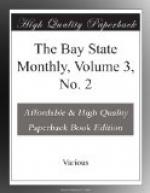They were the legitimate successors of the bards and scalds of early times whose art was considered divine and their songs worthy of regal patronage. They were the historians, genealogists, poets, and musicians, of the land. The word minstrel is derived from the Latin minister, a servant, because they were classed among the King’s attendants. An earlier Saxon name for this class of performers was “Gleeman,” in rude English, a Jogeler or Jocular; Latin, “Joculator.” The word “glee” is from the Saxon “gligg,” meaning music; and the meaning now attached to that word shows how intimately associated were pleasure and music in the national mind. The harp was the most ancient of Saxon musical instruments. It continued in use for a thousand years. It was well known in the time of Chaucer. His Frere could play upon it and sing to it; the merry “wife of Bath” had frequently danced to it in her youth. It was an ordinary accompaniment of revels and tavern festivals. It continued in use till the reign of Elizabeth. In Dr. Percy’s “Reliques of ancient English poetry” he speaks of the minstrels as an order of men in the Middle Ages, highly honored, retained and pensioned by kings, lavishly rewarded by nobles, and kindly entertained by the common people.[3] Ritson in his “Ancient Songs” admits that such an “order” of singers existed in France, but never in England; that individuals wandered up and down the country chanting romances and singing songs or ballads to the harp or fiddle; but that they never enjoyed the respect of the high born or received favors from them. The church evidently looked upon them with disfavor, as the enemies of sobriety and the promoters of revelry and mirth. In the sixteenth century they lost all credit and were classed, in penal enactments, with “rogues and vagabonds.” One reason of the decline of minstrelsy was the introduction of printing and the advance of learning: that which might afford amusement and pleasure when sung to the harp, lost its point and spirit when read in retirement from the printed page. Their composition would not bear criticism. Besides, the market had become overstocked with these musical wares; as the religious houses had with homilies and saintly legends. The consideration bestowed on the early minstrels “enticed into their ranks idle vagabonds,” according to the act of Edward I, who went about the country under color of minstrelsy; men who cared more about the supper than the song; who for base lucre divorced the arts of writing and reciting and stole other men’s thunder. Their social degeneracy may be traced in the dictionary. The chanter of the “gests” of kings, gesta ducum regumque, dwindled into a gesticulator, a jester: the honored jogelar of Provence, into a mountebank; the jockie, a doggrel ballad-monger.
Beggars they are by one consent,
And rogues by act of Parliament.
What a fall was there from their former high estate and reverence. The earliest minstrels of the Norman courts, doubtless, came from France, where their rank was almost regal.




